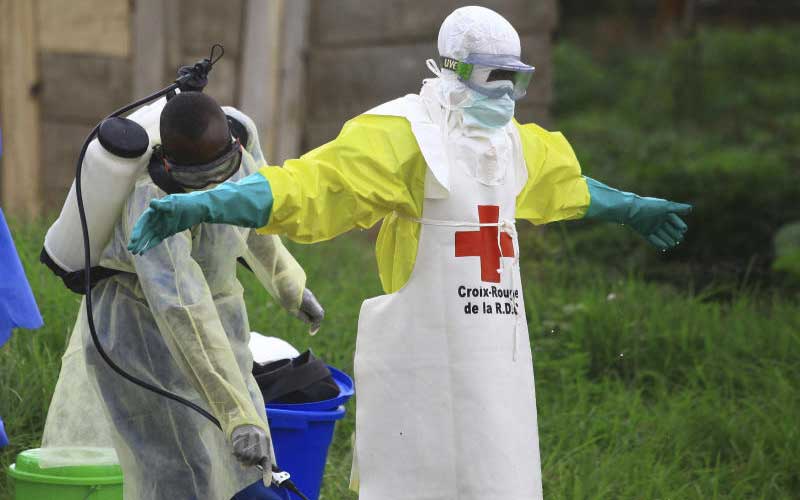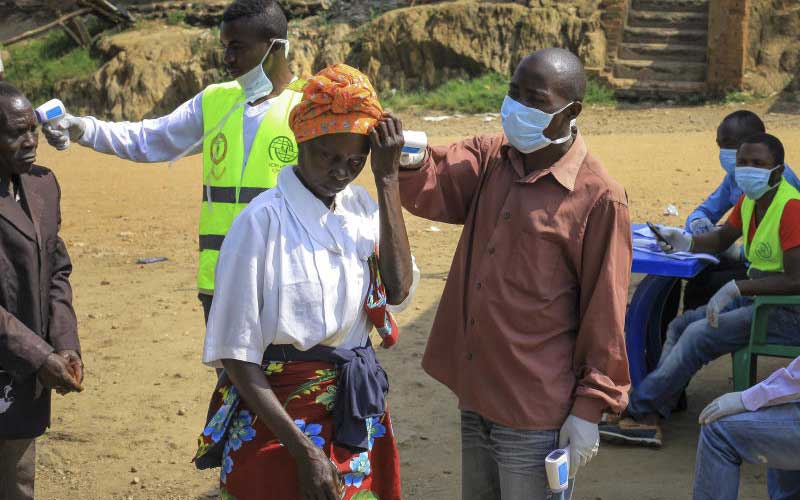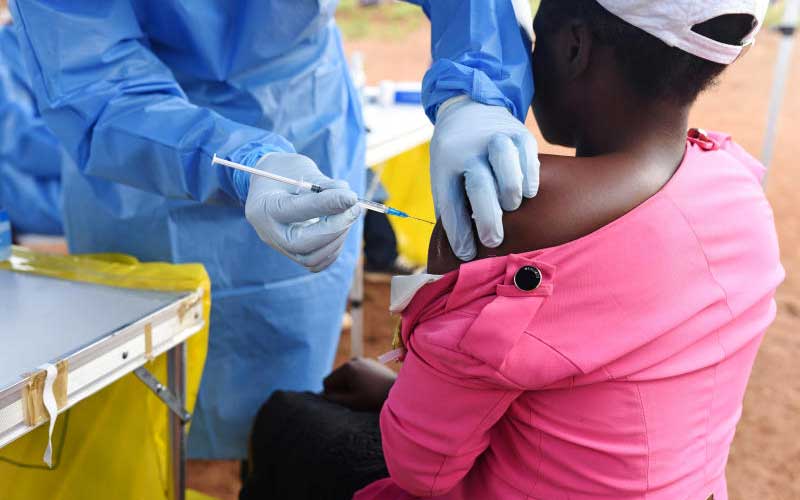
When Ebola crossed borders into Uganda on June 9, her neighbours went into a high alert.
A 5-year-old boy vomiting blood became the first cross-border victim of the Ebola Virus Disease (EVD) in Uganda. Hours after it was reported by World Health Organisation on Tuesday, he died.
Last night, his grandmother also succumbed to the disease.
His three-year-old brother and a man, 23 are still in isolation.
The family had attended the burial of an Ebola patient in Democratic Republic of Congo (DRC).
The outbreak in Congo, the second largest on record, has infected more than 2,000 people and caused 1,390 deaths since it was discovered in July 2018.
Kenya has since intensified screening at the border entry points of Busia and Malaba. The Ministry of Health, in a communiqué to newsrooms, listed seven preventive mechanisms targeting travellers from Uganda and DRC.
“We appeal to members of the public to remain vigilant and report any suspected cases of persons presenting above symptoms and with a history of recent travel to affected countries, to the nearest health facility or Health’s Emergency Operations Centre through the following hotlines 0732353535/0729471414,” it read in part.

As the authorities race to contain the deadly virus, here's what you need to know about Ebola and what's being done to stop its spread:
Origin
The Ebola virus is named after a river in the Democratic Republic of Congo, where it was first recognised. It comprises four distinct subtypes: Zaire, Sudan, Côte d'Ivoire and Reston.
Ebola virus disease (EVD) was formerly known as Ebola haemorrhagic fever and often affects humans. Non-human primates (monkeys, gorillas, and chimpanzees) can also contract the disease.
According to WHO, the average EVD case fatality rate is around 50 per cent. The agency further notes, the case fatality rates have varied from 25 per cent to 90 per cent in past outbreaks.
The largest Ebola outbreak in history ravaged the West African nations of Guinea, Liberia and Sierra Leone from 2014 to 2016, killing more than 11,300 people.
Symptoms
Ebola is often characterised by the sudden onset of fever, intense weakness, muscle pain, headache and sore throat.
The victims are then hit with vomiting, diarrhoea, rash, impaired kidney and liver functions and, in some cases, both internal and external bleeding. Laboratory findings include low white blood cell and platelet counts and elevated liver enzymes.
The fever has an incubation period of two to 21 days. This means someone can be infected with the virus and not yet know that he or she is sick for up to 21 days when the symptoms begin to appear.
According to the CDC, a blood test can only be positive for Ebola once symptoms appear.
However, it takes 42 days for a country to be declared free of Ebola transmission. WHO doubles the 21-day incubation period of the virus to ensure no new infections are happening.
Transmission
It is thought that fruit bats of the Pteropodidae family are natural Ebola virus hosts. Humans get the virus when they get into close contact with the blood, secretions, organs or other bodily fluids of infected animals.
You can also get the virus when you touch the objects that have been contaminated with body fluids (like blood, faeces, vomit) from an infected person.
Health care workers have frequently been infected while treating Ebola patients. Burial ceremonies where mourners have direct contact with the body of the deceased person have also led to the spread.
WHO notes, people remain infectious as long as their blood contains the virus.
Cure
There is no known cure for the disease just yet, but scientists are scrambling to find one. Patients are, however, put on supportive care (rehydration with oral or intravenous fluids) while doctors treat specific symptoms to improve survival.
Vaccine?
An experimental Ebola vaccine, rVSV-ZEBOV, was tried out in Guinea in 2015. Among the 5837 people who received the vaccine, no Ebola cases were recorded 10 days or more after vaccination.
The vaccine is currently in use in DRC.

How can you prevent and control the disease?
Reduce the risk of wildlife-to-human transmission with no contact with infected fruit bats, monkeys, apes, forest antelope or porcupines and or eating of their raw meat.
Thoroughly cook animal products before consuming them.
Always ensure a safe and dignified burial of the dead, identifying people who may have been in contact with someone infected with Ebola and monitoring their health for 21 days.
WHO also recommends that male survivors of EVD practice safer sex and hygiene for 12 months from onset of symptoms or until their semen tests negative twice for Ebola virus.
Sources: Centre for Disease Control and Prevention, World Health Organisation.
 The Standard Group Plc is a multi-media organization with investments in media
platforms spanning newspaper print
operations, television, radio broadcasting, digital and online services. The
Standard Group is recognized as a
leading multi-media house in Kenya with a key influence in matters of national
and international interest.
The Standard Group Plc is a multi-media organization with investments in media
platforms spanning newspaper print
operations, television, radio broadcasting, digital and online services. The
Standard Group is recognized as a
leading multi-media house in Kenya with a key influence in matters of national
and international interest.











